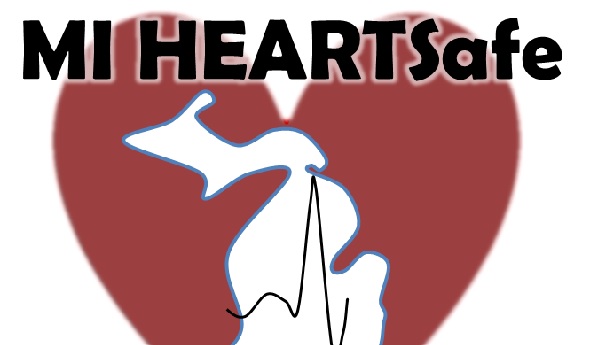
122 Schools Recognized as HEARTSafe
May 15, 2015
The Michigan departments of Health and Human Services (MDHHS), and Education (MDE); American Heart Association (AHA); Michigan High School Athletic Association (MHSAA); and Michigan Alliance for Prevention of Sudden Cardiac Death of the Young (MAP-SCDY) have awarded 122 schools in Michigan with the MI HEARTSafe School designation which recognizes schools that are prepared to respond to cardiac emergencies.
“Sudden cardiac death claims the lives of more than 300 Michigan children and young adults between the ages of one and 39 years of age each year,” said Dr. Eden Wells, chief medical executive of MDHHS. “Implementation of CPR and an automated external defibrillator (AED) within 3-5 minutes is crucial for increasing the chance of survival. Cardiac arrest is often unexpected and frightening, and I’m pleased to see so many of our schools taking preventative measures to address this health issue.”
Between 1999 and 2009 in Michigan, there were 3,134 young individuals between 1 and 39 years of age who died of sudden cardiac death. Of those, 246 were between 5 and 19 years of age. In its second year, the MI HEARTSafe Schools designation is Michigan’s commitment to reducing the number of sudden cardiac death in our youth. Last year was the first year of the program, and 40 schools were designated in Michigan.
“MDE is proud to support MI HEARTSafe schools,” said State Superintendent Mike Flanagan. “Ensuring schools are prepared for sudden cardiac emergencies through planning, training, and AEDs is an important part of having safer learning environments for students, staff, and the community.”
Public Act 12 of 2014 requires all schools (grades kindergarten to 12) to have a cardiac emergency response plan in place. This designation recognizes 122 schools that have taken steps above and beyond to prepare to respond in the event of a cardiac emergency, and is awarded for a period of three years. Click for the list of designated schools.
“The Michigan High School Athletic Association is proud to partner with the state of Michigan to promote the MI HEARTSafe Schools program,” said Jack Roberts, executive director of the Michigan High School Athletic Association. “It’s important we all do our part to help schools prepare for unexpected emergencies to keep children in our communities safe.”
In order for a school to receive a MI HEARTSafe designation, it must perform at least one cardiac emergency response drill per year, have a written medical emergency response plan and team, have current CPR/AED certification of at least 10 percent of staff, have accessible, properly maintained and inspected AEDs with signs identifying their location and ensure pre-participation sports screening of all student athletes using the current physical and history form endorsed by the Michigan High School Athletic Association.
Schools that meet all of the requirements will be able to apply for the MI HEARTSafe School designation each year. Click for more information about the MI HEARTSafe Schools program.

Century of School Sports: Let the Celebration Begin
By
Geoff Kimmerly
MHSAA.com senior editor
August 28, 2024
A milestone is an opportunity to look back, and we’ll surely dip into our history plenty during the 2024-25 school year as the Michigan High School Athletic Association celebrates 100 years of educational athletics.
But an anniversary of this magnitude also provides an ideal opportunity – at an ideal time in MHSAA history – to explain how we provide opportunities for students to participate in sports, and why that work remains vital.
Beginning next week and continuing through our final championship events next spring, we’ll be telling several of these stories as part of our “Century of School Sports” series on MHSAA.com.
School sports have advanced significantly over the last century, of course, but the values we strive to teach in educational athletics have remained consistent – and we’ll detail several of those efforts and how they’ve evolved over the years. There also are more high achievers and difference-makers worthy of recognition than we could ever highlight even during a year-long quest. But we will do our best to tell you about as many as possible.
Perhaps the most valuable lesson we at the East Lansing office learned during the COVID-19 pandemic is that school sports are just as meaningful to communities all over Michigan, and despite any perceived notion they are being pushed to the background by the multitude of non-school sports options that have sprouted over the last few decades.
We care about them enough to make them our life’s work – and we’re excited to tell many stories of what’s been, what we enjoy today and perhaps what’s to come for the next million student-athletes who will learn lifelong lessons studying in our extension of the classroom.

